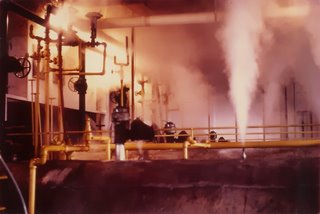Judge Holland on processors - "an astonishing ruse"

Check this out. "Judge Russell Holland of Anchorage, Alaska, called the agreements between Exxon and Seattle based fish processors "pernicious and flagrant violations of public policy," and said they amounted to "an astonishing ruse.""
A fisherman won't have to use retorts like these to can his salmon in a couple of years. Development continues on a continuous micro-wave process. Another reason "processors" are worried.
His ruling bars Exxon and the fish processors, known in the case as the Seattle Seven, from getting any of the $5 billion. The Seattle companies, which number more than seven, are:
Icicle Seafoods, Inc.
Peter Pan Seafoods Inc.
Seven Seas Corp. [Peter Pan]
Stellar Seafoods Inc. [Peter Pan]
Ocean Beauty Seafoods Inc.
Ocean Beauty Alaska Inc.
Wards Cove Packing Co.
Alaska Boat Co. [Wards Cove crab fleet]
North Pacific Processors Inc. [owners of Alaska Pacific in Kodiak]
ADF Inc. dba Aleutian Dragon Fisheries
Trident Seafoods Corp.
North Coast Seafood Processors Inc.
This is the bulk of the membership roster of the Pacific Seafood Processors Association, who's Executive Director sits as Chair of the North Pacific Fisheries Management Council. And which Council is claiming a December deadline for divvying up the groundfish of the Gulf of Alaska. And which divvying options all force fishermen to bring their catch back to specified "processors."
Now look at the ownership of a few of these companies. According to the 1994 Legislative Research Agency reports:
January 21, 1994 - to Senator Loren Lehman, from Betsy Jensvold, Leg. Analyst Research request # 94.048
KODIAK = SHORESIDE PLANTS:
Alaska Pacific Seafoods Marubeni Corp. 100% Japan
Dai Ichi Seafood Lt. confidential Canada
King Crab Inc. Ika Muda (Ocean Beauty) 100% Indonesia
Western Alaska Fisheries Maruha (form. Taiyo) 100% Japan
Int'l Seafoods of AK Inc. Int'l Oceanic Enterp. 100? (Korea?)
Some miscellaneous information from a comprehensive Frank Orth and Associates study of ownership of processing capacity.
"North Pacific had plants in Cordova (Salmon,Crab, Grndfish) and Naknek (Sal + Herring) also 100% owned by Marubeni. They also owned Bering Sea Fisheries in Emmonak 25% (Salmon). Marubeni's 20% share of Wards Cove was bought out by the Brindles that borught 15 shore-based operations back into total US hands.
Marubeni owned 100% of Kenai Packers (Sal, Herring, Hal) in 1994, as well- but this might be skewed, as Daubenspeck owned it 100% earlier, and may still have."
"Marubeni held 50% of Sitka Sound Seafoods (multi-species) in Sitka and Yakutat and Dry Bay, + the F/V Frontier Spirit. (Sitka Sound Seafoods was purchased in recent years by Clearwater, a Canadian company with a British parent. And Marubeni held 100% of Togiak Fisheries (sal, Hrg), as it long did."
Ocean Beauty was purchased by Indonesian interests, but operations were taken over by a venture capital company in Los Angeles.
When the Brindles sold all their plants in recent years, they were snapped up for a dime on the dollar by a lot of folks who wanted to give processing a shot. The ownership of these plants, down to the 1% of stock, has not been established in one document for public consumption to my knowledge. You typically went to the Japanese for financing like this though, because of their interest in getting the product at a discount.
At the moment, Icicle Seafoods is employee majority owned. This could change if they could find a buyer like they did last time. They were going to sell for ten times stock value to BCCI Bank at one point, but that bank was found to be a scam to relieve rich Arabs of their wealth. I guess nobody figured the Arabs would miss a few hundred million.
Still, the main issue isn't a theft of public resources by the "processors," mostly from the fishermen, and the communities they support with their spending. One issue is that the "processors" are using the term "economic efficiency" as a ruse. (Didn't a Judge say that was what they were up to?) It is a manufactured term, just like "rationalization." "Profit center" is now being used by the ADF&G Commissioner to describe their central role in the economy of Alaska. They are taking credit for every trapper and handliner harvesting fish and game to survive.
ADF&G say they are responsible for $5 billion of economic activity in Alaska last year. What a crock. They are responsible for law enforcement and selling licenses to harvest just so much fish and game. If they had their way in trimming half the fleet for the sake of "economic efficiency" the $5 billion number would be a billion or so smaller. What a conradiction!
"Economic efficiency" is not public policy. Remember, there is a 58 foot limit on the length of a salmon seiner, and the seines and gillnets are limited in length. There are limits on the number of crab pots you can use. The health of the communities is public policy, and for that you need a way to increase the financial health of fishermen, not decrease it. And for that you need fishermen to vertically integrate their businesses, not get rid of their businesses.
The main issue is that there are tools in place now to help fishermen do that and the processors don't want to be cut out. They intend to cut out the fishermen first. And the fishermen don't donate to campaigns a tiny fraction as much as the "processors." This piece is just designed to get the reader past the "how could there be a plot?" to at least "what would they do that for?" Just rub your thumb and forefinger together and you'll get the idea.
Read this Primer On How To End The Race For Fish. Notice the credentials of this Canadian organization. The 50 page report came out Sept. 2005, and notice it doesn't propose "processor linkages" or "processor quotas." Compare the legitimacy of this report to the sole discredited economist of the NPFMC and the ADF&G.


<< Home